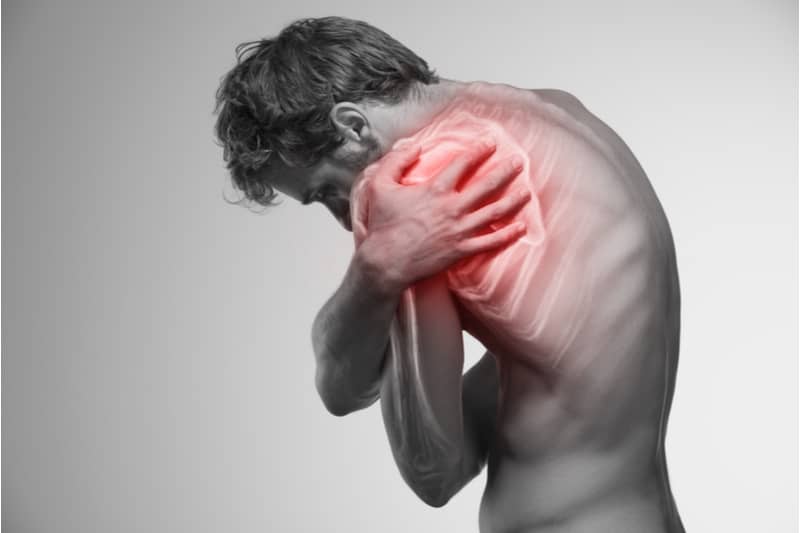A torn rotator cuff can be more than just a shoulder problem—it may also lead to discomfort in your neck and even trigger headaches. Understanding the relationship between these symptoms is key to finding the right treatment.
The rotator cuff consists of four muscles and their associated tendons, which work together to stabilize and move your shoulder joint. When the rotator cuff is torn, whether due to trauma, repetitive strain, or degeneration over time, the stability and function of the shoulder are compromised. This often forces other parts of your body, particularly the neck and upper back, to compensate, which can lead to further discomfort and secondary symptoms.
How a Rotator Cuff Tear Causes Neck Pain
The connection between a torn rotator cuff and neck pain lies in the intricate relationship between muscles and movement. When your shoulder’s mobility is restricted or compromised due to the injury, other muscles—primarily those in your neck, upper back, and trapezius—may be forced to take on additional stress to maintain movement. This overcompensation often leads to muscle tension, stiffness, and inflammation in the neck.
As the body tries to adapt, neck pain may intensify, becoming chronic if the root cause—the rotator cuff tear—goes untreated. The more you push through the shoulder injury, the more likely you are to experience an increase in discomfort around the neck, which can limit your overall range of motion and quality of life.
Can a Torn Rotator Cuff Cause Headaches?
Surprisingly, the pain from a torn rotator cuff can radiate beyond the neck and trigger headaches. These are commonly referred to as cervicogenic headaches, which occur when pain in the neck is referred to the head. Since the muscles and nerves in your neck are closely connected to your head, any tension, inflammation, or nerve compression can cause pain to spread.
When you suffer from a rotator cuff tear, the increased strain on the muscles around the neck may compress the nerves that travel up to the scalp, resulting in tension headaches. These headaches often feel like a dull, pressure-like pain that can radiate from the base of the skull to the forehead, behind the eyes, or around the temples. Patients commonly describe these as “tight band” headaches that worsen with certain neck or shoulder movements.
If you’ve noticed an increase in neck pain accompanied by headaches following a shoulder injury, a torn rotator cuff could be the underlying issue. Identifying and addressing the shoulder problem can relieve the secondary symptoms, including the neck pain and headaches.

Traditional Treatments for Rotator Cuff Tears
Rotator cuff injuries can vary in severity, ranging from minor strains to complete tears. Depending on the extent of the damage, treatment options have traditionally included:
Our patients benefit from the expertise of highly trained lab biologists, who perform procedures in our state-of-the-art lab facility. GIOSTAR’s approach provides a unique combination of evidence-based scientific techniques and a highly personalized approach to patient care.
In addition to its collaboration with the world’s leading academic and research institutions, GIOSTAR distinguishes itself from other therapy providers with its unwavering commitment to the needs of our patients. Because each patient’s condition is different, individuals must complete a medical history form that is rigorously reviewed by our clinical review team. Not all patients that apply are accepted for therapy.
Rest and physical therapy
For minor tears, rest and physical therapy exercises can help restore shoulder function and reduce compensatory muscle strain.
Medications
Anti-inflammatory medications may help manage pain and inflammation.
Surgery
In cases of severe or complete tears, surgery is often recommended to repair the damaged tendons and restore shoulder function.
However, these traditional methods, especially surgery, come with drawbacks. Surgical intervention often involves a long recovery period, limited mobility during healing, and potential complications like infection or stiffness. Many patients are also concerned about the risk of re-injury or lingering pain post-surgery.
Stem Cell Therapy: A Cutting-Edge Alternative to Surgery
At GIOSTAR Chicago, we provide a less invasive, cutting-edge option for treating rotator cuff tears: stem cell therapy. This regenerative treatment is designed to harness the body’s natural ability to heal and repair itself, offering patients a non-surgical solution for their injuries.
Stem cell therapy works by injecting concentrated cells from your own body into the affected area. These regenerative cells have the ability to stimulate healing, reduce inflammation, and repair damaged tissues. Over time, this can lead to improved shoulder function, decreased pain, and better overall mobility.
Benefits of Stem Cell Therapy for Rotator Cuff Tears:
- Non-Surgical Solution: Avoid the risks and long recovery times associated with surgical repair.
- Accelerated Healing: Stem cells can help regenerate damaged tissues and enhance the body’s natural healing processes.
- Reduced Inflammation and Pain: Stem cells have potent anti-inflammatory properties that can help alleviate pain and reduce swelling.
- Minimally Invasive: Unlike surgery, stem cell therapy is minimally invasive, with little to no downtime required, allowing patients to return to their normal activities sooner.
- Lower Risk of Complications: Stem cell therapy carries fewer risks compared to surgery, such as infection or scar tissue formation.
By opting for stem cell therapy, you may be able to avoid the extensive rehabilitation that often follows surgical intervention and instead focus on a faster, more natural recovery process.
How GIOSTAR Chicago Can Help
If you’re struggling with a rotator cuff tear and dealing with secondary symptoms like neck pain or headaches, we’re here to help. At GIOSTAR Chicago, our team specializes in stem cell therapy for orthopedic injuries and offers personalized care to help you achieve the best possible outcomes.
Stem cell therapy provides a promising alternative to traditional treatments, helping patients regain their mobility, reduce pain, and improve their quality of life without the need for invasive surgery.
Learn More About Stem Cell Therapy
Interested in learning more about how stem cell therapy could be the right option for your rotator cuff injury? We invite you to visit our dedicated stem cell therapy page to discover the benefits of regenerative medicine and how it can help you recover from rotator cuff tears while avoiding surgery.
About GIOSTAR Chicago:
GIOSTAR Chicago is dedicated to developing the most advanced stem cell-based technologies and providing the best regenerative medicine for people who want to enjoy a healthy and active lifestyle.


